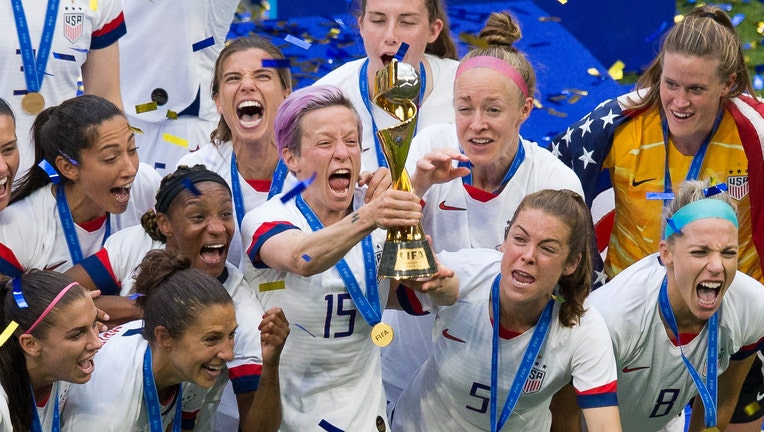Women's soccer claim of unequal pay tossed, can argue travel

FILE - Megan Rapinoe of USA lifts the winners trophy and celebrates with team mates after the 2019 FIFA Women's World Cup France Final match between The United States of America and The Netherlands at Stade de Lyon on July 7, 2019 in Lyon, France. (Photo by Craig Mercer/MB Media/Getty Images)
LOS ANGELES (AP) - A federal judge threw out the unequal pay claim by players on the U.S. women's national soccer team but allowed their allegation of discriminatory travel accommodations and medical support services to go to trial.
Players led by Alex Morgan claim they have not been paid equally under their collective bargaining agreement to what the men’s national team receives under its labor deal and asked for more than $66 million in damages under the Equal Pay Act and Title VII of the Civil Rights Act of 1964.
In a 32-page decision Friday, U.S. District Judge R. Gary Klausner granted in part a motion for summary judgment by the U.S. Soccer Federation. He threw out the Equal Pay Act allegations but left intact the Civil Rights Act claims.
“The history of negotiations between the parties demonstrates that the WNT rejected an offer to be paid under the same pay-to-play structure as the MNT, and the WNT was willing to forgo higher bonuses for benefits, such as greater base compensation and the guarantee of a higher number of contracted players,” Klausner wrote.
RELATED: USWNT fighting for equal pay while defending their World Cup title
“Accordingly, plaintiffs cannot now retroactively deem their CBA worse than the MNT CBA by reference to what they would have made had they been paid under the MNT’s pay-to-play terms structure when they themselves rejected such a structure,” he said.
Klausner left intact claims the USSF discriminated in its use of charter flights, hotel accommodations, medical support services and training support services.
A trial is scheduled for June 16 in federal court in Los Angeles.
“We are shocked and disappointed with today’s decision, but we will not give up our hard work for equal pay," Molly Levinson, spokeswoman for the women's players, said in a statement. “We are confident in our case and steadfast in our commitment to ensuring that girls and women who play this sport will not be valued as lesser just because of their gender.”
Players intend to ask the 9th U.S. Circuit Court of Appeals to overturn Klausner's decision, a move that could delay the trial.
“We have learned that there are tremendous obstacles to change; we know that it takes bravery and courage and perseverance to stand up to them,” Levinson said.


